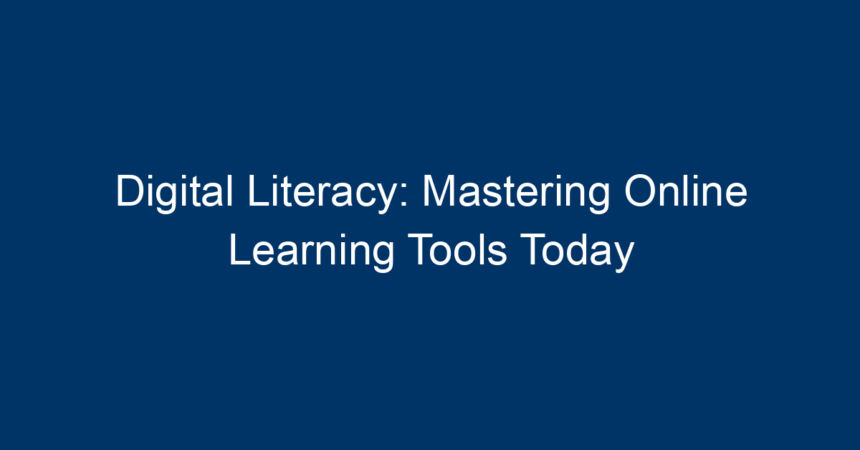In today’s fast-paced digital landscape, digital literacy is not just a buzzword; it’s a fundamental skill set essential for navigating the complexities of modern education, work environments, and daily life. With an avalanche of online tools available, mastering these resources can significantly enhance your learning experience and career prospects. This article delves deep into the significance of digital literacy, the various online learning tools at your disposal, and actionable strategies to improve your skills.
Understanding Digital Literacy
Digital literacy refers to the ability to effectively and critically navigate, evaluate, and create information using a range of digital technologies. This involves not just knowing how to use devices or software, but also understanding how to discern reliable information, engage ethically with others online, and utilize digital resources to solve problems.
As our world becomes increasingly reliant on technology, enhancing our digital literacy is crucial. It empowers individuals to participate fully in society — from accessing healthcare resources to advancing in their careers.
Why Digital Literacy Matters
-
Career Opportunities: The digital age has transformed many industries, creating new jobs that require specific digital skills. Employers value candidates who demonstrate expertise in using online tools and platforms.
-
Educational Advancement: Schools and universities are integrating technology into their curricula. Understanding digital tools equips students to engage with their learning process actively.
- Informed Decision-Making: With a wealth of information available online, being digitally literate helps individuals evaluate the credibility of sources, fostering informed decision-making.
The Evolution of Online Learning Tools
Online learning tools have evolved dramatically over the past decade, transforming the educational landscape. Here’s a closer look at some key categories of learning tools that enhance digital literacy.
Learning Management Systems (LMS)
Platforms like Moodle, Canvas, and Blackboard serve as central hubs for accessing course materials, assignments, and grades. These systems facilitate interaction between teachers and students through forums, quizzes, and multimedia content.
- Benefits:
- Flexibility in accessing materials
- Streamlined communication with peers and instructors
- Tracking progress and performance
Collaboration Tools
Tools such as Google Workspace, Microsoft Teams, and Slack enable real-time collaboration. These applications enhance teamwork and allow students and professionals to work together, regardless of their physical locations.
- Benefits:
- Seamless sharing of documents and ideas
- Real-time feedback and communication
- Improved project management capabilities
Multimedia and Presentation Tools
Platforms like Prezi, Canva, and Kayak allow users to create compelling presentations and visuals. These tools encourage creativity and aid in conveying ideas effectively.
- Benefits:
- Engaging content creation
- Enhances presentation skills
- Supports digital storytelling techniques
Educational Apps
Mobile applications such as Duolingo, Khan Academy, and Quizlet offer interactive learning experiences tailored to individual needs. These apps often gamify learning, making it an enjoyable process.
- Benefits:
- Learning at your own pace
- Access to diverse subjects
- Convenient learning on the go
Developing Your Digital Literacy Skills
Improving your digital literacy requires a proactive approach. Here are actionable strategies to sharpen your skills and fully harness the power of online learning tools.
Step 1: Set Clear Goals
Define what you want to achieve with your digital literacy. Whether your focus is on career advancement, academic performance, or personal growth, having clear objectives will guide your learning process.
Step 2: Explore Online Courses
Numerous platforms offer free or affordable courses, including Coursera, edX, and Udacity. These courses cover a plethora of topics, from basic computer skills to advanced data analysis.
Step 3: Engage in Digital Communities
Joining online forums or communities, such as Reddit or LinkedIn groups, can provide insights and support from peers and professionals in your field of interest. Engage in discussions, ask questions, and share your experiences.
Step 4: Practice Regularly
Like any skill, digital literacy improves with practice. Regularly using different tools and applications will enhance your comfort and proficiency. Challenge yourself by creating projects or collaborating on group tasks.
Step 5: Stay Updated
The digital realm is ever-evolving. Keeping abreast of the latest trends and tools will ensure that your skills remain relevant. Subscribe to newsletters, blogs, or podcasts that focus on digital innovations and educational technologies.
Navigating Common Challenges in Digital Literacy
Despite the benefits, many individuals face hurdles when developing their digital literacy. Here’s how to navigate some common challenges:
Fear of Technology
For many, the thought of using new tools can be intimidating. Overcoming this fear begins with a mindset shift. Embrace mistakes as learning opportunities. Start with user-friendly tools and gradually progress to more complex ones.
Information Overload
The abundance of information can feel overwhelming. Use critical thinking skills to assess the credibility of sources. Familiarize yourself with evaluating online content based on authority, relevance, and accuracy.
Time Management
Balancing learning with other responsibilities can be challenging. Implement time management techniques, such as the Pomodoro Technique, to ensure dedicated time for enhancing your digital skills without feeling burned out.
Conclusion: Embrace the Future of Learning
In a world where digital literacy is paramount, mastering online learning tools can significantly influence your personal and professional growth. By understanding the importance of digital literacy, exploring the variety of available tools, and implementing strategies to develop your skills, you position yourself for success.
Start today by setting your goals, engaging with online communities, and practicing consistently. The journey to becoming digitally literate is not only about acquiring skills; it’s about embracing a way of learning that will serve you well into the future. Equip yourself for the ever-evolving digital age and unlock countless opportunities with digital literacy as your guide.
By prioritizing your digital literacy, you harness the full potential of online learning tools, paving the way toward a more informed, engaged, and successful future.




